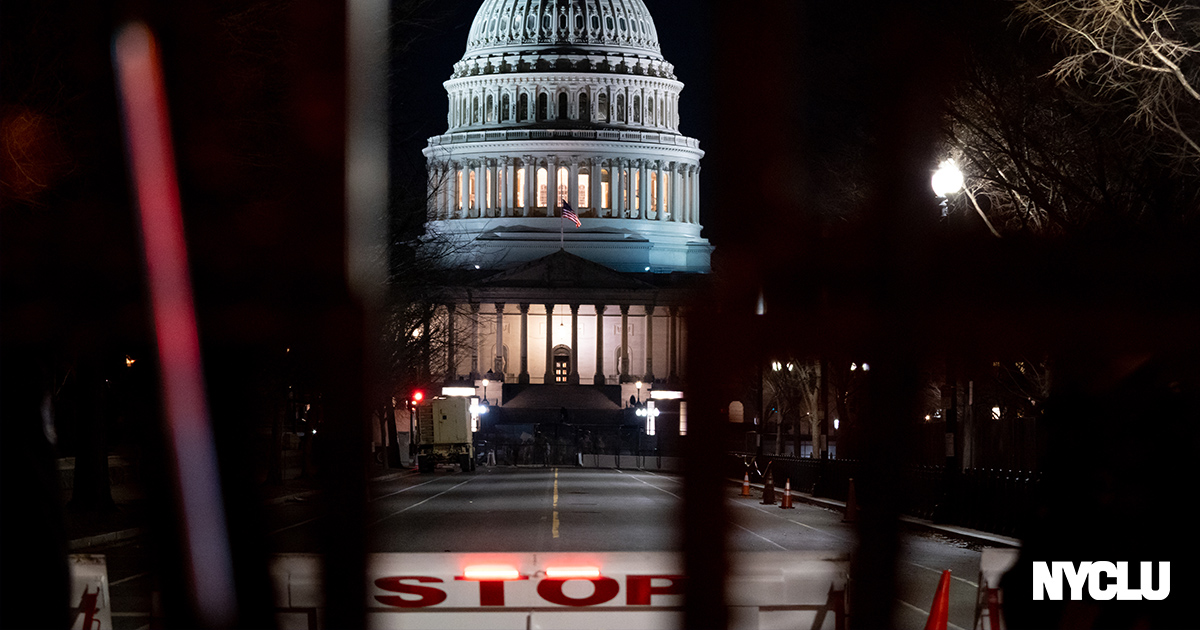The Capitol Attack Cannot be an Excuse for More Criminalization

It only took a few hours before the insurrection at the Capitol on January 6 provoked an understandable, predictable, and worrying response from politicians on both sides of the aisle. The calls quickly came for an expansion of criminal laws and government power in an echo of what happened after 9/11.
After just 13 people were arrested immediately following the events at the Capitol, there was justifiable anger from many Americans who, over the previous summer, had seen thousands of Black Lives Matter protesters – who posed no safety threat – end up in handcuffs.
Then more arrests started to pile up in the days and weeks after the attack at the Capitol. Some of them came as the result of the use of invasive and increasingly ubiquitous facial recognition technology.
There were also calls – including from President Biden – for a new domestic terror law. A working group advising Biden also urged him to increase funding to combat this ill-defined crime.
Some Republicans unleashed bad faith attempts to harness the legitimate fear, anger, and dismay generated by the Capitol attack to prop up the value of law enforcement.
“I sure am glad that at least for one day, I didn’t hear my Democrat colleagues calling to defund the police,” Rep. Matt Gaetz said in a speech on the House floor just hours after rioters had finally been cleared from the building.
But preventing another insurrection by a white supremacist mob is not a matter of giving the government more power to criminalize more behavior, or shoveling more money at local and federal law enforcement agencies. It is a matter of will. As the ACLU’s Hina Shamsi, and Manar Waheed explain:
“Federal agencies could use a plethora of hate crimes statutes that Congress passed to protect communities of color and other marginalized groups targeted by white supremacist violence. Over 50 statutes relate to domestic terrorism offenses and material support for it. These existing measures are flawed and overbroad, but if law enforcement agencies wanted to use them to address white supremacist violence, they could.”
As law enforcement clamors for more funding and power, we shouldn’t forget the clips of Capitol Police officers posing for selfies with rioters. The officers who did try to prevent the mob from causing mayhem were not overwhelmed because the department lacks resources. The Capitol Police Department has 2,300 officers and an annual budget of $516 million to protect two square miles.
But the Department’s full force was not utilized because white supremacist violence isn’t viewed as a threat by those at the top.
Still, the solution is not to give police departments more money and more tools to put people behind bars for longer in exchange for the promise to finally take the dangers of white supremacy seriously.
For one thing, the definition of what constitutes domestic ‘terrorism’ is quite vague. The Patriot Act defines domestic terrorism as, among other things, “a violation of the criminal laws of a state or the United States” that is intended to “influence the policy of a government by intimidation or coercion.”
It’s easy to see any new domestic terrorism law being wielded to target Black Lives Matter protesters, environmental activists, Palestinian rights advocates and many others. The victims of this new law would undoubtedly be the same types of people who are disproportionately targeted by other criminal laws – poor people of color.
Here in New York, we know all too well what happens when law enforcement is given carte blanche after an attack on our country. In the days after 9/11, hundreds of innocent Muslims were rounded up, abused, and held for months. Entire Muslim neighborhoods in New York and New Jersey were put under surveillance by the NYPD entirely because of their religion.
Even if a new terror law is supposedly enacted to crackdown on white supremacist violence, history tells us it will be expanded beyond that original justification.
And just as new laws will surely be stretched, any new money or technology secured by law enforcement in the wake of the Capitol attack is likely to be used much more to further existing enforcement priorities that disproportionately target communities of color than they will for combatting future far-right carnage.
Facial recognition technology, for example, is being used to track down and arrest people who allegedly committed crimes at the Capitol. But people in communities of color know far too well how facial recognition is usually used to surveil and falsely identify them and their loved ones. We don’t need to spend more money to make this technology omnipresent.
And despite what the Rep. Gaetzs of the world say, the last thing the Capitol attack should prompt us to do is backtrack from efforts to defund the police. Giving law enforcement lots of money does not make them effective. New York City, for example, spends $11 billion of its annual budget on the NYPD, yet the department fails to charge someone in the vast majority of serious crimes.
We cannot let our legitimate concerns over the insurrection lead us down a dangerous path that we’ve been down before. If we do, it will ultimately hurt the same people white supremacists seek to victimize.
